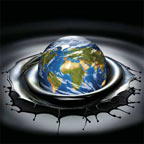
The thirst for energy to fuel the modern industrial
economy seems to be unquenchable. The appetite for oil exploits people and
societies, ravages the environment and threatens the essentials of life. The
connection between oil and water is not immediately obvious.
Vast quantities of water are needed to produce bio-fuel, a substitute for
petroleum. Michael Webber, an environmental policy specialist at the American
Association for the Advancement of Science says that the water required to power
an alternative fuel vehicle can be 100 times more than that required for a
gasoline powered vehicle. This water is used mainly to irrigate corn and wheat
crops, but as river levels continue to drop and the underground aquifers dry
up, “the link between water and energy is going to become an issue”.
The Alberta Tar Sands Project is causing much acid rain and toxic effluent to be
dumped into holding ponds. The companies take 3 barrels of water from the
Athabasca River to process the sand to produce one barrel of oil. Waste goes
into the river. David Schindler, professor of ecology at the University of
Alberta warns that “the combination of increasing mining activities and climate
change would trigger a serious crisis affecting the quantity and quality of the
water supply in Alberta”.
For every action there is a reaction, whether physically, emotionally, mentally
or otherwise. In the search for oil or alternative fuels, there are
consequences. As thinking beings, we need to be aware of the potential
consequences of our endeavours and act in accordance with that which reason and
intelligence dictate to be of benefit not only for us, but for others as well.
Let us attend to the happenings of our world. Let us climb that metaphoric
mountain, not only to glimpse the beauty of Nature, but also to observe the
effects of actions wrought by “progress” and remember that contemplation without
action is futile.